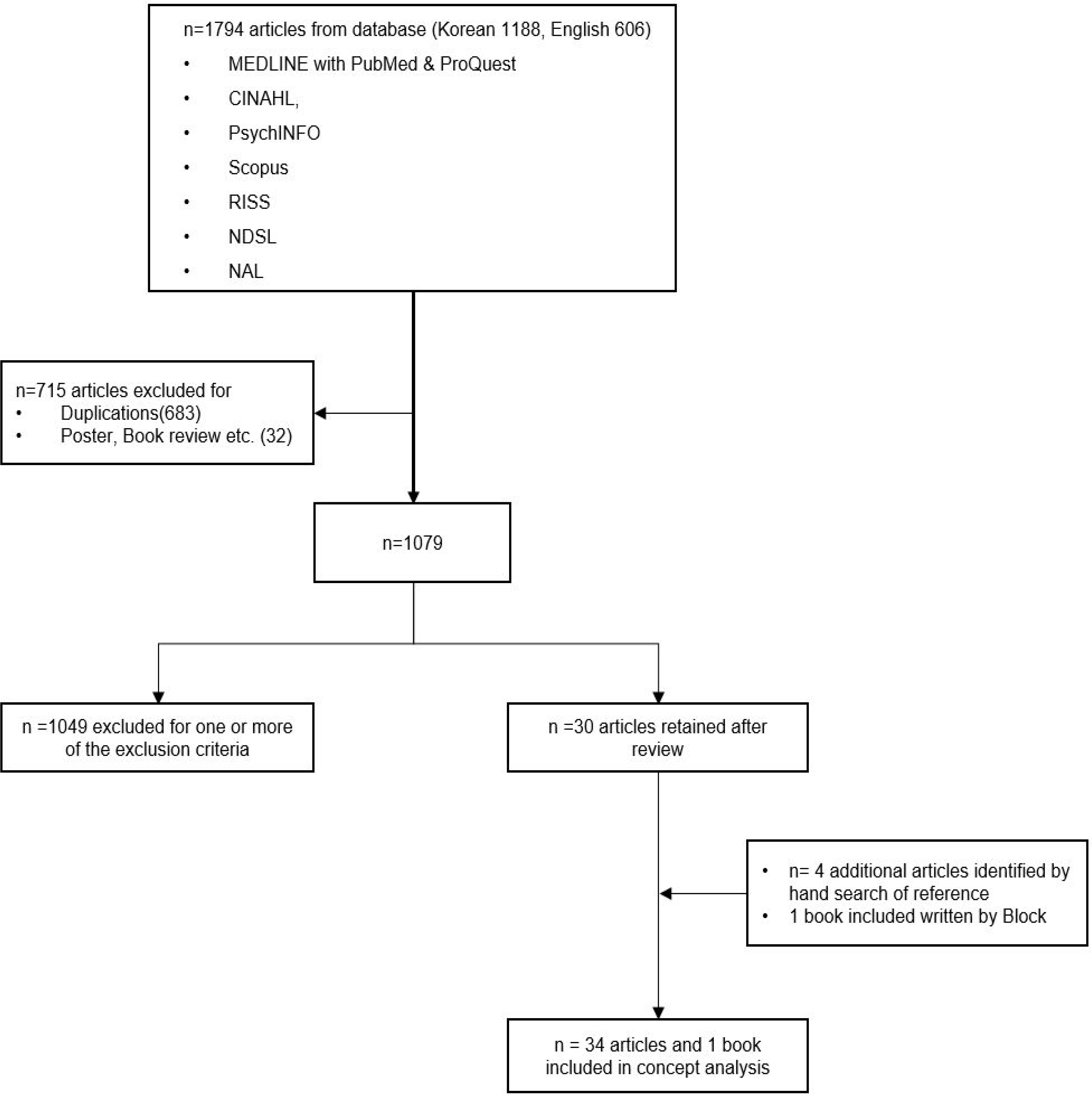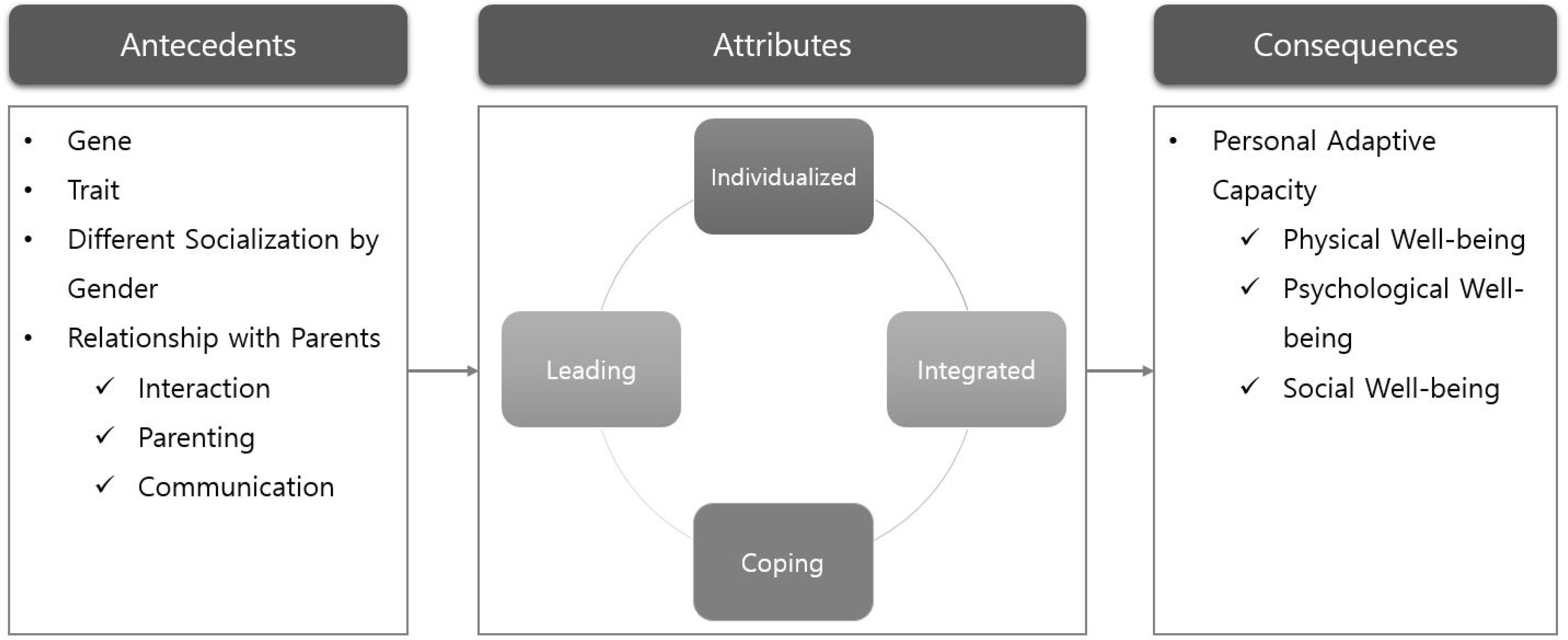Abstract
Purpose
This study was aimed to clarify the concept of ego-resiliency in the context of nursing and to propose a definitionof ego-resiliency.
Methods
Rodgers' evolutionary approach to concept analysis was used to identify common attributes, antecedents, and consequences of the term ego-resiliency. A literature search of the RISS, NDSL, NAL, CINAHL, PubMed, MEDLINE, PsycINFO, and Scopus databases from 1980 to 2014 was conducted, using the key words of ego-resiliency, ego-resilience, and ego-resilient. Thirty-four relevant articles and one book were finally selected and throughly reviewed.
Go to : 
REFERENCES
1.Alessandri G., Vecchio GM., Steca P., Caprara MG., Caprara GV. A revised version of kremen and block's ego resiliency scale in an italian sample. Testing, Psychometrics, Methodology in Applied Psychology. 2007. 14(3-4):165–83.
2.Klohnen EC. Conceptual analysis and measurement of the construct of ego-resiliency. Journal of Personality and Social Psychology. 1996. 70(5):1067–78.

3.Farkas D., Orosz G. Ego-resiliencyreloaded: athree-component model of general resiliency. PLoS One. 2015. 10(3):1–26.
4.Luthar SS., Cicchetti D., Becker B. The construct of resilience: a critical evaluation and guidelines for future work. Child Development. 2000. 71(3):543–62.

5.Philippe FL., Laventure S., Beaulieu-Pelletier G., Lecours S., Le-kes N. Ego-resiliency as a mediator between childhood trauma and psychological symptoms. Journal of Social and Clinical Psychology. 2011. 30(6):583–98.

6.Block J., Kremen AM. IQ and ego-resiliency: conceptual and empirical connections and separateness. Journal of Personality and Social Psychology. 1996. 70(2):349–61.

7.Vanderbilt-Adriance E., Shaw DS. Conceptualizingandreevalu-atingresilience acrosslevels of risk, time, and domains of competence. Clinical Child and Family Psychology Review. 2008. 11(1-2):30–58.
8.Lee AS., Yoon CK., Park JK. Effects of social support and ego-resilience on nursing performance of hospitalnurses. Korean Academic Society of Occupational Health Nursing. 2012. 21(3):283–9.
9.Cho O-H., Hwang K-H. The influences between new nurses' nursing performance, emotional intelligence, self-resiliency and core self-evaluation. The Journal of the Korea Contents Association. 2014. 14(7):291–301.

10.Cho HJ., Jung MS. Effect of empathy, resilience, self-care on compassion fatigue in oncology nurses. Journal of Korean Academy of Nursing Administration. 2014. 20(4):373–82.

11.Yun S-Y., Min S-H. Influence of ego-resilience and spiritual well-being on college adjustmentin major of nursingstudent. Journal of Digital Convergence. 2014. 12(12):395–403.
12.Ji EJ., Bang MR., Jeon HJ. Ego resilience, communication ability and problem-solving ability in nursing students. The Journal of Korean Academic Society of NursingEducation. 2013. 19(4):571–9.

13.Park W-J., Han JY. The effect of ego-resilience, stress coping styles, teaching, effectiveness, andfamily supporton satisfaction of clinical practice in nursing students by AMOS structural equation model. The Journal of Korean Academic Society of Nursing Education. 2011. 17(3):365–75.
14.Klohnen EC., Vandewater EA., Young A. Negotiatingthemiddle years: ego-resiliencyand successfulmidlife adjustment in women. Psychology and Aging. 1996. 11(3):431–42.
15.Kim MH., Kim SH. Development of an ego-resilience scale for middle school students. The Korea Journal of Counseling. 2010. 11(1):189–206.
16.Rodgers BL. Concept analysis: an evolutionary view. Rodgers BL, Knafl KA, editors. Concept development in nursing: foundations, techniques, and applications. 2nd ed.Philadelphia: Saunders;2000. p.77-102.
17.Block JH., Block J. The role of ego-control and ego-resiliency in the organizationofbehavior. In: Development of cognition, affect, and social relations: L. Erlbaum Associates. 1980.
18.Winkler A. Resilience as reflexivity: a new understanding for workwith looked-after children. Journal of Social Work Practice. 2014. 28(4):461–78. http://dx.doi.org/10.1080/02650533.2014.896784.
19.Chuang SS., Lamb ME., Hwang CP. Personality development from childhood to adolescence: a longitudinal study of ego-control and ego-resiliency in Sweden. International Journal of Behavioral Development. 2006. 30(4):338–43.
20.Vecchione M., Alessandri G., Barbaranelli C., Gerbino M. Stabil-ityandchangeofegoresiliencyfromlateadolescencetoyoung adulthood: a multiperspective study using the ER89-R scale. Journal of Personality Assessment. 2010. 92(3):212–21.
21.Block J., Block JH. Venturing a 30-year longitudinal study. American Psychologist. 2006. 61(4):315–27.

22.Pals JL. Identity consolidation in early adulthood: relations with ego-resiliency, the context of marriage, and personality change. Journal of Personality. 1999. 67(2):295–329.

23.Block JH., Block J. The role of ego-control and ego-resiliency in the organization of behavior. Collins WA, editor. Development of cognition, affect, and socialrelations. 2nded.New York: Psychology Press;2009. p. 39–101.
24.Milioni M., Alessandri G., Eisenberg N., Vecchione M., Caprara GV. The predictive role ofego-resiliency on behavioural problems. European Journal of Developmental Psychology. 2015. 12(2):220–33.
25.Suh KH., An JS., Kim G. The moderatingeffectofego-resilience on parentification and subjective well-being of high school students. The Korean Journal of Health Psychology. 2012. 17(4):1027–43.
26.Swanson J., Valiente C., Lemery-Chalfant K., O'Brien TC. Predicting early adolescents' academic achievement, social competence, and physical health from parenting, ego resilience, and engagementcoping. Journal of Early Adolescence. 2011. 31(4):548–76.
27.Utsey S., Hook J., Fischer N., Belvet B., Utsey SO., Hook JN, et al. Cultural orientation, ego resilience, and optimism as predictors of subjective well-being in African Americans. The Journal of Positive Psychology. 2008. 3(3):202–10.

28.Taylor ZE., Sulik MJ., Eisenberg N., Spinrad TL., Silva KM., Leme-ry-Chalfant K, et al. Development of ego-resiliency: relations to observed parenting and polymorphisms in the serotonin transporter gene during early childhood. Social Development. 2014. 23(3):433–50.

29.Taylor ZE., Eisenberg N., Spinrad TL., Eggum ND., Sulik MJ. The relations of ego-resiliency and emotion socialization to the developmentofempathy and prosocial behavior across early childhood. Emotion. 2013. 13(5):822–31.
30.Smeekens S., Marianne Riksen-Walraven J., van Bakel HJA. Cortisolreactions in five-year-olds to parent-child interaction: the moderating role of ego-resiliency. Journal of Child Psychology and Psychiatry. 2007. 48(7):649–56.
31.Gjerde PF., Block J., Block JH. Egocentrism and ego resiliency: personality characteristics associated with perspective-taking from early childhood to adolescence. Journal of Personality and Social Psychology. 1986. 51(2):423–34.

32.Letzring TD., Block J., Funder DC. Ego-control and egoresilien-cy: generalization of self-report scales basedon personality descriptions from acquaintances, clinicians, and the self. Journal of Research in Personality. 2005. 39(4):395–422.
33.Song JE., Ahn JA. Effect of intervention programs for improving maternal adaptation in Korea: systematic review. Korean Journal of Women Health Nursing. 2013. 19(3):129–41.

34.Park CS. Factors influencing on burnout experience in working nurses athospital. Korean Journal of Women HealthNursing. 2002. 8(4):550–8.
Go to : 
Table 1.
Literature Review Analysis Criteria
Table 2.
Some of the Definitions of Ego-resiliency




 PDF
PDF ePub
ePub Citation
Citation Print
Print




 XML Download
XML Download